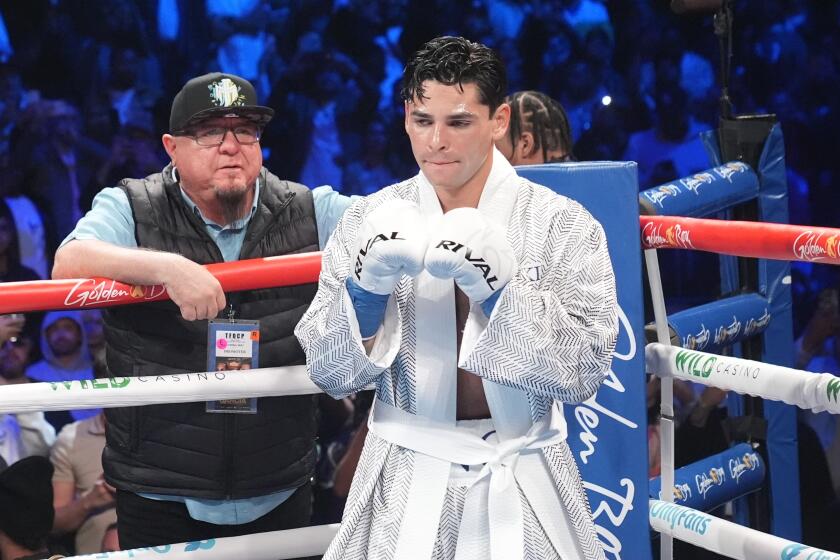It’s safer in the ring for Antonio Margarito
When it comes to house-hunting, there aren’t too many neighborhoods in which welterweight champion Antonio Margarito can’t afford to shop.
The Mexican boxer will earn $2.3 million for about an hour’s work Saturday against Shane Mosley at Staples Center, just slightly more than Margarito got in his last paycheck. And it’s certainly enough to get him through the gates of even the most exclusive communities.
Instead, he has chosen to stay in a crowded house on a crowded street in one of the world’s most dangerous cities.
In Tijuana, where Margarito lives, no one is safe at home.
The lawless city is on the front lines of a drug war that has killed nearly 450 people in the last four months, nearly four times the number of U.S. combat deaths in Iraq and Afghanistan combined over that span.
And the anarchy shows no signs of slowing.
“The violence is now attacking everyone,” Margarito’s wife Michelle laments in Spanish. “They don’t respect anything.”
Not even the world welterweight title, which Margarito won in July with an impressive 11th-round TKO of previously unbeaten Miguel Cotto. And that leaves the fighter with a tough decision: Abandon Tijuana for the relative safety of Southern California, where his managers and trainer live, and he leaves behind the people who watched him grow up, supporting him as much for his humble devotion to his roots as for his hard-charging style in the ring.
“It’s impressive how many people recognize him,” Michelle says. “Almost everyone knows him. If we go to the movies, people are going ‘ooooohh.’ ”
But if he stays, he risks something even greater -- his safety and the safety of those around him.
“I don’t know what to do,” Sergio Diaz, one of Margarito’s managers, says with a shake of his head.
The son of a door-to-door salesman, Margarito, 30, was born in Torrance but grew up on the hardscrabble streets of Tijuana, where he and brother Manuel found refuge in a neighborhood boxing gym.
He turned pro at 15, choosing to battle men in the ring at an age when most of his peers were battling nothing stronger than acne. Fighting for small purses in dank gyms and cheap hotel ballrooms in Northern Mexico and Southern California, he dreamed of making enough to buy a small house for himself and Michelle, his grade-school sweetheart.
And there was never any doubt where that house would be.
“We’re both from Tijuana. We grew up in these same neighborhoods,” Michelle says.
Adds Margarito: “I’m comfortable there.”
Even the unsolved murder of his brother, executed in his living room as he watched television in 1999, couldn’t sway Margarito.
“I have my routine. I go to the gym. I go for my runs,” he says in Spanish. “When I leave the house, everyone says hello. Everything’s fine.”
Well, not really. Not anymore. Not when severed bodies are routinely dumped in Tijuana’s streets and even the slightest fame or fortune can become an invitation for killers and kidnappers.
Margarito’s punches may be deadly in the ring, where he has a record of 37-5, with 27 knockouts.
But they’re no match for men with automatic weapons.
“You always knew bad things happened in Tijuana. But just in the last couple of years, things got worse,” Michelle says. “We can’t go out like we used to with peace of mind.
“Tony has always had the idea that he is from there and he doesn’t have to leave. [But] people see him, people know him. They know where he lives. They know everything. That’s dangerous.”
The boxer, whose home is protected by nothing more than a cheap alarm, says he isn’t frightened by what the cartels and drug runners might do to him. It’s what they might do to his wife or her three teenage brothers, who live with them.
“When something is going to happen, it’s going to happen. It has to happen,” Margarito says. “In reality, that doesn’t scare me. What scares me is that happening to my wife.”
So sometime this spring he will move to a gated community in California, joining an exodus of Mexican athletes and entertainers who have sought safety in the U.S. But while most of them have gone to Miami or Los Angeles, Margarito, known as the Tijuana Tornado for his unrelenting attack, is looking at homes in southern San Diego County, within sight of Mexico.
And that will play well with his fan base.
“Tijuana practically is San Diego. There’s not going to be much of a change,” says three-time world champion Marco Antonio Barrera of Mexico City, who recently joined ESPN Deportes as an analyst for the network’s expanded boxing coverage. Margarito “is 100% Mexican and he’ll continue to be 100% Mexican.”
Four-time world champion Erik Morales of Tijuana, who has trained in the same gym as Margarito, agrees.
“The situation is difficult in Tijuana,” says Morales, who moved to San Diego nearly five years ago despite the fact he directs sports programs for the government in his hometown.
“What’s important is what you do in the ring and that you’re still from Tijuana. You visit there, you come to events there.
“But your house is something very private, very personal. You have to look for the most comfortable situation possible.”
Of course Margarito, who splits most of his pre-fight training camps between La Puente and Montebello, also has fans on this side of the border. When Margarito entered the Home Depot Center to watch Mosley’s September bout with Nicaraguan Ricardo Mayorga, he received a huge ovation. And the demand for tickets to Saturday’s fight has been so great promoters recently made another 5,000 seats available by opening the upper level of Staples Center.
“He’s now the stud Mexican fighter,” promoter Bob Arum said of Margarito, whose blue-collar work ethic and willingness to take a punch have played well.
“He’s a warrior in the ring,” Barrera adds of Margarito. “Mexicans like that style. All Latin boxing fans like that style.”
And even after Margarito, a U.S. citizen with an American passport, changes his address, that’s likely to remain the same.
“He might not be sleeping there. But he’s going to be in Tijuana,” Diaz, the fighter’s manager, says. “I don’t think Antonio would ever leave it.”
--
More to Read
Go beyond the scoreboard
Get the latest on L.A.'s teams in the daily Sports Report newsletter.
You may occasionally receive promotional content from the Los Angeles Times.











